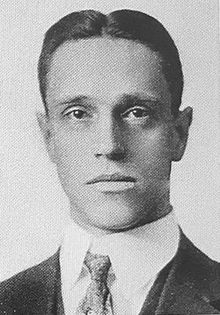Abbott Payson Usher
Abbott Payson Usher | |
|---|---|
 |
Abbott Payson Usher (January 13, 1883 – June 18, 1965)[1][2] was an American economic historian. The Society for the History of Technology (SHOT) has awarded the Abbot Payson Usher Prize, named in his honor, annually since 1961.[3]
In the late 1920s Usher, the American historian Lewis Mumford and the Swiss art historian Sigfried Giedion began to systematically investigate the social consequences of technology.[4] In A History of Mechanical Inventions Usher argued that technological innovation was a slow, collective process with many contributors, not relying on the genius of great inventors.[5]
In 1963 Usher was awarded the Leonardo da Vinci Medal by the Society for the History of Technology (SHOT). His daughter Miriam Usher Chrisman was a noted historian of the German Reformation.[6]
He earned his BA and PhD at Harvard University.[7]
Publications
- The History of the Grain Trade in France, 1400–1710. Harvard University Press. 1913. ISBN 0-374-98063-2.
- An introduction to the industrial history of England. Houghton Mifflin. 1920.
- A History of Mechanical Invention. McGraw-Hill. 1929. (Harvard University Press, 1954; Dover Publications, 1988 ISBN 0-486-25593-X)
- The early history of deposit banking in Mediterranean Europe. Harvard Economic Studies. Vol. 75. Harvard University Press. 1943.
References
- ^ Who Was Who in America. Vol. 4. Marquis Who's Who. 1968. p. 962. OCLC 1036919787.
- ^ Smith, Thomas M. (Autumn 1965). "Memorial: Abbott Payson Usher (1883-1965)". Technology and Culture. 6 (4): 630–632. JSTOR 3101756.
- ^ "The Usher Prize". Archived from the original on 2009-06-02. Retrieved 2009-10-06.
- ^ Cutcliffe, Stephen H. (1989). In Context History and the History of Technology: Essays in honor of Melvin Kranzberg. Lehigh University Press. pp. 88–89. ISBN 978-0-934223-03-4.
- ^ Molella, Arthur P. (October 2005). "The Longue Durée of Abbott Payson Usher". Technology and Culture. 46 (4): 779–796. doi:10.1353/tech.2006.0027. JSTOR 40060959. S2CID 144217545.
- ^ "Miriam Chrisman Papers". UMass Special Collections. University of Massachusetts. Retrieved 23 January 2021.
- ^ "Usher, Abbott P. | Encyclopedia.com". www.encyclopedia.com. Retrieved 2022-11-23.
